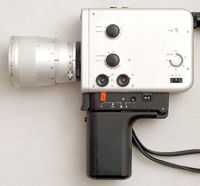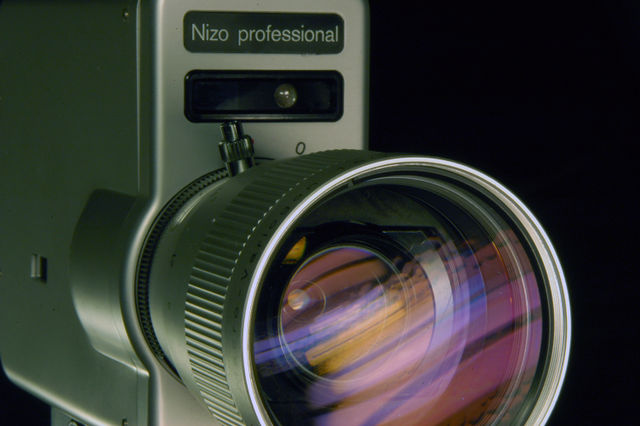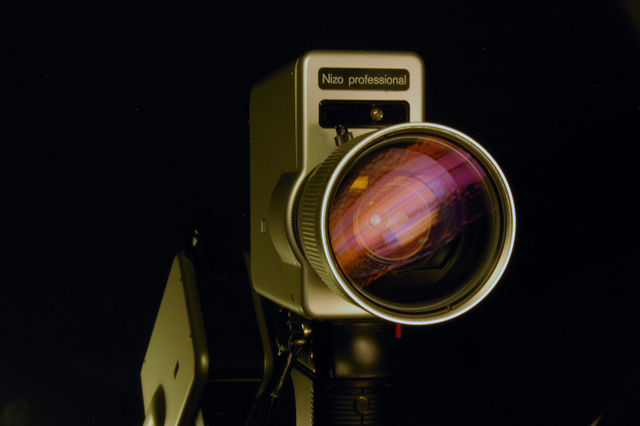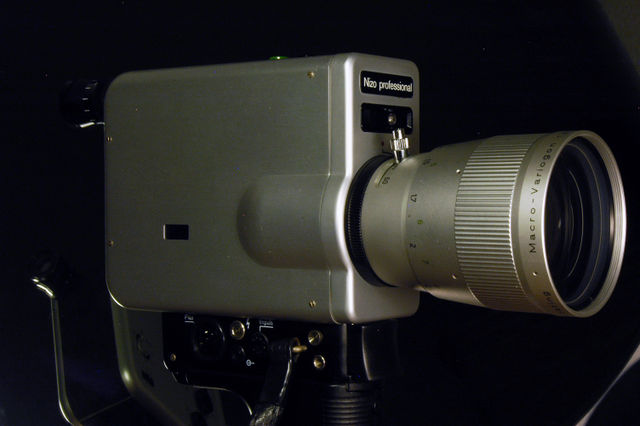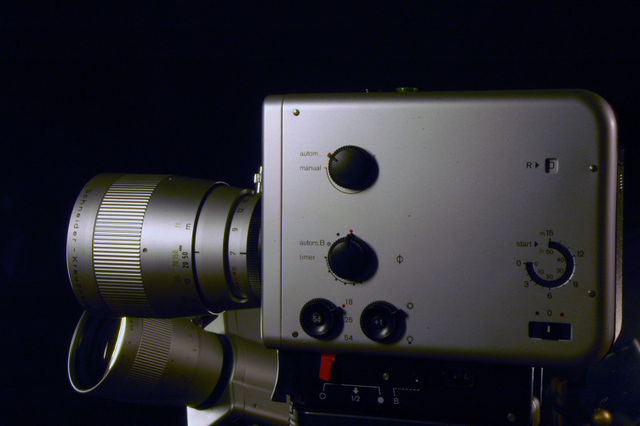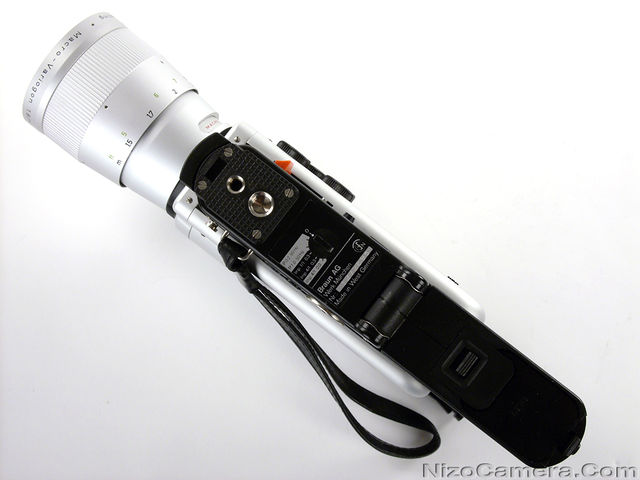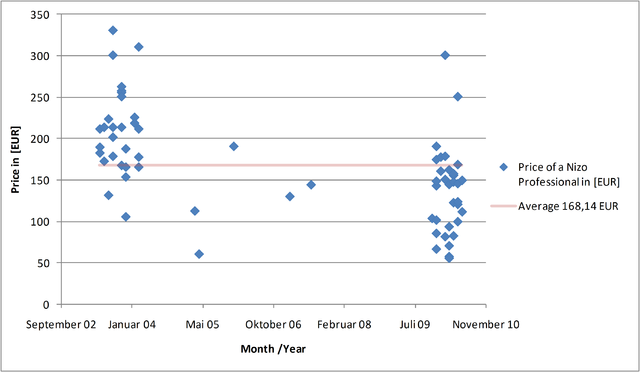Difference between revisions of "Nizo 800 P Professional"
(→Usable Film Stock for this Camera) |
(→Reviews: please use the wiki's features and styles) |
||
| (14 intermediate revisions by 4 users not shown) | |||
| Line 20: | Line 20: | ||
| optical = No | | optical = No | ||
| weight = 1400g | | weight = 1400g | ||
| − | | | + | | dimensions = 23cm x 21cm x 7,5cm |
| power = 6 x AA / external | | power = 6 x AA / external | ||
| original$ = aprox. 1.185 | | original$ = aprox. 1.185 | ||
| Line 93: | Line 93: | ||
[[Image:NIZO_Pro_003.JPG|640px|click to enlarge]] | [[Image:NIZO_Pro_003.JPG|640px|click to enlarge]] | ||
[[Image:NIZO_Pro_004.JPG|640px|click to enlarge]] | [[Image:NIZO_Pro_004.JPG|640px|click to enlarge]] | ||
| + | [[Image:NIZO_Pro_005.JPG|640px|click to enlarge]] | ||
==Comments== | ==Comments== | ||
| Line 102: | Line 103: | ||
==Reviews== | ==Reviews== | ||
| − | The Nizo professional is one of the best super8 cameras ever built. Alongside the professional [[:Category:Beaulieu|Beaulieu-cameras]], the [[:Leicina Special|Leicina special]], the [[Bauer S 715 XL Microcomputer]], the [[:Nikon R 10 Super|Nikon R10]], the [[:Canon 1014 XL-S CANOSOUND|Canon 1014XL-S]] and some others it has extensive features | + | The Nizo professional is one of the best super8 cameras ever built. Alongside the professional [[:Category:Beaulieu|Beaulieu-cameras]], the [[:Leicina Special|Leicina special]], the [[Bauer S 715 XL Microcomputer]], the [[:Nikon R 10 Super|Nikon R10]], the [[:Canon 1014 XL-S CANOSOUND|Canon 1014XL-S]] and some others it has extensive features combined in a - for the time - quite small form factor. As the first camera of its kind, the legendary Nizo professional has been equipped with a Schneider Macro-Variogon 1,8/7-80 mm lens system. This multi-coated masterpiece of optic precision engineering enables zoom and macro capabilities which have been superior compared to the majority of cameras available in the mid 70´s. The lens system of a Nizo professional can produce sharp and colour neutral shots with a minimal object distance of 1.5m. Objects in macro-scale can be filmed as near as 1cm, whereas the macro-range of the lens follows the final position of the wide angle scale. The minimal picture field is within 41 x 30mm. |
| − | At its introduction in 1975 Braun presents its top-of-the-line model as a compact camera, which, given the | + | At its introduction in 1975, Braun presents its top-of-the-line model as a compact camera, which, given the 12x zoom now capable of macro takes using the build-in lens and the delicate weight of 2 kg seems a little bit understated. However, the Nizo professional was, compared to its rival products and as already mentioned above, built quite compactly. Braun's design department, under the chairmanship of Dieter Rams is responsible for the still attention drawing shaping of the Nizo professional and the silver family. The accessibility of the few control elements and switches is cleaned up and well aligned. But none the less ,the Nizo professional features technical goodies such as the further developed time exposure. Due to a special light meter, each frame is exposed exactly the amount of time needed for the given light setting. Afterwards, the next frame is automatically brought into the picture frame and released for exposure by the light sector of the rotatable shutter. Thus, static scenes can be banned on film outstandingly without the use of any hand-held light meter, fiddling and calculations. Unfortunately, the camera is missing a frame counter, which is incomprehensible regarding the complex automatic time lapse incorporated in the Nizo professional. |
| − | The Nizo professional is powered by 6 standard AA batteries which are housed in a | + | The Nizo professional is powered by 6 standard AA batteries which are housed in a battery-box and are therefore secured in case of any battery leakage. The battery-box used in the camera can be used in almost all of the later Nizo cameras. A unique feature of the Nizo professional is the fold-able handle, which houses the batteries, and is capable of powering the camera even while back-folded. If the handle is back-folded a stable ground plate offers standard tripod mounting capabilities allowing a very sturdy fixation compared to the mounting position found on the bottom of the handle. The later one used to be very shaky due to the unstable plastic housing of the handle itself. In contrast to its model family (the S 800, S 801 and so on) the battery-pack does additionally power the build in light meter. Thus avoiding an extra battery-set of two 1,35 V Cells which are hard to find nowadays. The Nizo professional does also feature a power-supply-plug where one of Braun's supplies, such as the SRN 80 can be used to power the camera over an extended period of time. This is especially useful for long time lapse shots. |
| + | |||
| + | ===by Super8Scientist, 2018=== | ||
| + | Pros: The two reasons to get this camera (to shoot with) in my opinion are the handle that lets you continue shooting with it folded back (unique to this Nizo), and the lens. The lens is an 8.7/10, not my favorite but definitely good. And slightly better than the S 800 and the 801 macro. The sync-sound option built into the camera is definitely cool, though I'm not sure why you'd use it as this isn't really a quiet camera. The camera is also relatively lightweight. | ||
| + | Cons: I've never really liked the design of the Nizos, they always feel kind of plastic-y and they tend to scratch and dent easily. You'd think this being the "professional" model that they'd reinforce the outer shell a bit but I don't think they did. I almost always reach for my 6080 instead of this camera. A serviced 6080 will match the Professional in image quality and is a more useful camera for live sound recording. | ||
| + | Otherwise it does make a nice (albeit expensive) collection piece, especially considering William Shatner used a Nizo camera in the Star Trek episode "Patterns of Force". | ||
==Usable Film Stock for this Camera== | ==Usable Film Stock for this Camera== | ||
| Line 118: | Line 124: | ||
| 10 | | 10 | ||
| 11° | | 11° | ||
| − | | | + | | 9 |
| − | | | + | |No Super8 film stock available at the moment (2011) |
|- | |- | ||
| 12 | | 12 | ||
| 12° | | 12° | ||
| 11 | | 11 | ||
| − | | | + | |No Super8 film stock available at the moment (2011) |
|- | |- | ||
| 16 | | 16 | ||
| 13° | | 13° | ||
| − | | | + | | 14 |
| − | | | + | |No Super8 film stock available at the moment (2011) |
|- | |- | ||
| 20 | | 20 | ||
| 14° | | 14° | ||
| 16 | | 16 | ||
| − | | | + | | No Super8 film stock available at the moment (2011) |
|- | |- | ||
| 25 | | 25 | ||
| 15° | | 15° | ||
| 22 | | 22 | ||
| − | | | + | | No Super8 film stock available at the moment (2011) |
|- | |- | ||
| 32 | | 32 | ||
| 16° | | 16° | ||
| − | | | + | | 28 |
| − | | | + | | No Super8 film stock available at the moment (2011) |
|- | |- | ||
| 40 | | 40 | ||
| 17° | | 17° | ||
| 32 | | 32 | ||
| − | | | + | | No Super8 film stock available at the moment (2011) |
|- | |- | ||
| 50 | | 50 | ||
| 18° | | 18° | ||
| 45 | | 45 | ||
| − | | | + | | Cineva 50D, Fujichrome Velvia 50, Kahl UT 18 Chrome, Spectra V 50D, Wittner Chrome V50D, Pro8mm Pro8/01 |
|- | |- | ||
| 64 | | 64 | ||
| 19° | | 19° | ||
| − | | | + | | 56 |
| − | | | + | | Pro8mm Pro8/22 |
|- | |- | ||
| 80 | | 80 | ||
| 20° | | 20° | ||
| 65 | | 65 | ||
| − | | | + | | No Super8 film stock available at the moment (2011) |
|- | |- | ||
| 100 | | 100 | ||
| 21° | | 21° | ||
| 90 | | 90 | ||
| − | | | + | | Ektachrome 100D 7285, Kahl UT 21 Chrome, Pro8mm Pro8/85, Pro8mm Pro8/12, Wittner Chrome 100D, FOMA Fomapan R100 |
|- | |- | ||
| 125 | | 125 | ||
| 22° | | 22° | ||
| − | | | + | | 110 |
| − | | | + | | ORWO UN 54 |
|- | |- | ||
| 160 | | 160 | ||
| 23° | | 23° | ||
| 130 | | 130 | ||
| − | | | + | | Pro8mm Pro8/43, Kodak Vision2 200T (**), Kodak Vision3 200T (**), Kodak Tri-X 7266 |
|} | |} | ||
| Line 186: | Line 192: | ||
# ISO arithmetic speeds from 10 to 160 are taken from ISO 12232:1998 (Table 1, p. 9). | # ISO arithmetic speeds from 10 to 160 are taken from ISO 12232:1998 (Table 1, p. 9). | ||
# [http://en.wikipedia.org/wiki/Film_speed Source for Table shown above] | # [http://en.wikipedia.org/wiki/Film_speed Source for Table shown above] | ||
| − | + | # (**) Even though the filmstock is rated as ISO 200/24°, the cartridges should be notched as ISO 160/23° | |
| − | + | ||
==eBay Auctions== | ==eBay Auctions== | ||
Latest revision as of 07:06, 1 July 2018
Contents
Features[edit]
- Manufacturer: Made in Germany by Niezoldi & Krämer / Braun
- Year of Production: 1974-77 (not sure if that´s correct)
- Lens: Schneider Macro-Variogon f1,8 / 7 - 80 mm multi-coated
- Zoom: Manual / Auto Zoom with 2 speeds
- Frame rates: 18, 25, 54 + single frame and variable frame speed (1 f/min. to 6 f/sec.)
- Exposure: Manual / Auto Exposure
- Film EI setting: automatic
| Film Stock Type | DIN scale (ASA Scale) |
|---|---|
| tungsten light | from 13 to 23 DIN (= 16 to 160 ASA) |
| daylight | from 11 to 21 DIN (= 10 to 100 ASA) |
| black and white | from 11 to 21 DIN (= 10 to 100 ASA) |
(for usable Film Stock for this Camera see table below)
- Shutter degree: variable
- Viewfinder: Diopter correction / Full ground glass / Split focus / exposure needle / battery check
- Sound: No
- Extras: fades and crossfades / lap dissolve / interval timer / time exposure / remote socket / flash contact / backlight control / Internal tone generator for sync sound (P.0,2 50 Hz / P.1,0 50 Hz / Imp. 1/1 0.3 / Imp. 4/1 0.3 / Imp. 4/1 0.0 ) / run lock
- Batteries: 6 X 1,5V AA batteries in separate safety box / Does NOT need extra lightmeter batteries
- External power supply : Yes / Camera can be powered by an external power supply such as Braun´s SRN 80
- Weight: 1400g
- Value: average of 168,14EUR on ebay
- Instruction manual: English instruction manual at mondofoto.com
- Design: Dieter Rams The famous designer has been head of Braun's design department for more than 40 years. Rams and his team had a strong influence on modern product design, inspiring designers even today - as this is the case with Jonathan Ive who works for Apple. Rams's team is responsible for the look of most of the Nizo super8 cameras. Especially the silver series and the late soundcameras of Braun are unique examples of the creativeness and the design ethos 'less is more' which has given raise to the probably most beautiful super8 camera's ever.
- Cost: 2000DM in Germany when new (= approx. 1000EUR)
- Useful Accessories: EWA-S8K Compendium Matte Box
Pictures[edit]
Comments[edit]
Nearly the same as Nizo S 800 except:
- no extra (not available) 2 x 1.35 V batteries for light-meter!
- 50Hz pilot tone for sound recording.
Some other modified Nizo's do not need extra light-meter batteries: all Adams64 models: 480, 481, 560, 561, 800, 801 (including macro)
Reviews[edit]
The Nizo professional is one of the best super8 cameras ever built. Alongside the professional Beaulieu-cameras, the Leicina special, the Bauer S 715 XL Microcomputer, the Nikon R10, the Canon 1014XL-S and some others it has extensive features combined in a - for the time - quite small form factor. As the first camera of its kind, the legendary Nizo professional has been equipped with a Schneider Macro-Variogon 1,8/7-80 mm lens system. This multi-coated masterpiece of optic precision engineering enables zoom and macro capabilities which have been superior compared to the majority of cameras available in the mid 70´s. The lens system of a Nizo professional can produce sharp and colour neutral shots with a minimal object distance of 1.5m. Objects in macro-scale can be filmed as near as 1cm, whereas the macro-range of the lens follows the final position of the wide angle scale. The minimal picture field is within 41 x 30mm.
At its introduction in 1975, Braun presents its top-of-the-line model as a compact camera, which, given the 12x zoom now capable of macro takes using the build-in lens and the delicate weight of 2 kg seems a little bit understated. However, the Nizo professional was, compared to its rival products and as already mentioned above, built quite compactly. Braun's design department, under the chairmanship of Dieter Rams is responsible for the still attention drawing shaping of the Nizo professional and the silver family. The accessibility of the few control elements and switches is cleaned up and well aligned. But none the less ,the Nizo professional features technical goodies such as the further developed time exposure. Due to a special light meter, each frame is exposed exactly the amount of time needed for the given light setting. Afterwards, the next frame is automatically brought into the picture frame and released for exposure by the light sector of the rotatable shutter. Thus, static scenes can be banned on film outstandingly without the use of any hand-held light meter, fiddling and calculations. Unfortunately, the camera is missing a frame counter, which is incomprehensible regarding the complex automatic time lapse incorporated in the Nizo professional.
The Nizo professional is powered by 6 standard AA batteries which are housed in a battery-box and are therefore secured in case of any battery leakage. The battery-box used in the camera can be used in almost all of the later Nizo cameras. A unique feature of the Nizo professional is the fold-able handle, which houses the batteries, and is capable of powering the camera even while back-folded. If the handle is back-folded a stable ground plate offers standard tripod mounting capabilities allowing a very sturdy fixation compared to the mounting position found on the bottom of the handle. The later one used to be very shaky due to the unstable plastic housing of the handle itself. In contrast to its model family (the S 800, S 801 and so on) the battery-pack does additionally power the build in light meter. Thus avoiding an extra battery-set of two 1,35 V Cells which are hard to find nowadays. The Nizo professional does also feature a power-supply-plug where one of Braun's supplies, such as the SRN 80 can be used to power the camera over an extended period of time. This is especially useful for long time lapse shots.
by Super8Scientist, 2018[edit]
Pros: The two reasons to get this camera (to shoot with) in my opinion are the handle that lets you continue shooting with it folded back (unique to this Nizo), and the lens. The lens is an 8.7/10, not my favorite but definitely good. And slightly better than the S 800 and the 801 macro. The sync-sound option built into the camera is definitely cool, though I'm not sure why you'd use it as this isn't really a quiet camera. The camera is also relatively lightweight. Cons: I've never really liked the design of the Nizos, they always feel kind of plastic-y and they tend to scratch and dent easily. You'd think this being the "professional" model that they'd reinforce the outer shell a bit but I don't think they did. I almost always reach for my 6080 instead of this camera. A serviced 6080 will match the Professional in image quality and is a more useful camera for live sound recording. Otherwise it does make a nice (albeit expensive) collection piece, especially considering William Shatner used a Nizo camera in the Star Trek episode "Patterns of Force".
Usable Film Stock for this Camera[edit]
| ISO arithmetic scale (ASA scale) |
ISO log scale (DIN scale) |
GOST (Soviet pre-1987) |
Example of film stock with this nominal speed |
|---|---|---|---|
| 10 | 11° | 9 | No Super8 film stock available at the moment (2011) |
| 12 | 12° | 11 | No Super8 film stock available at the moment (2011) |
| 16 | 13° | 14 | No Super8 film stock available at the moment (2011) |
| 20 | 14° | 16 | No Super8 film stock available at the moment (2011) |
| 25 | 15° | 22 | No Super8 film stock available at the moment (2011) |
| 32 | 16° | 28 | No Super8 film stock available at the moment (2011) |
| 40 | 17° | 32 | No Super8 film stock available at the moment (2011) |
| 50 | 18° | 45 | Cineva 50D, Fujichrome Velvia 50, Kahl UT 18 Chrome, Spectra V 50D, Wittner Chrome V50D, Pro8mm Pro8/01 |
| 64 | 19° | 56 | Pro8mm Pro8/22 |
| 80 | 20° | 65 | No Super8 film stock available at the moment (2011) |
| 100 | 21° | 90 | Ektachrome 100D 7285, Kahl UT 21 Chrome, Pro8mm Pro8/85, Pro8mm Pro8/12, Wittner Chrome 100D, FOMA Fomapan R100 |
| 125 | 22° | 110 | ORWO UN 54 |
| 160 | 23° | 130 | Pro8mm Pro8/43, Kodak Vision2 200T (**), Kodak Vision3 200T (**), Kodak Tri-X 7266 |
Table Notes[edit]
- ISO arithmetic speeds from 10 to 160 are taken from ISO 12232:1998 (Table 1, p. 9).
- Source for Table shown above
- (**) Even though the filmstock is rated as ISO 200/24°, the cartridges should be notched as ISO 160/23°
eBay Auctions[edit]
Prices one eBay:
- eBay Germany (source for the data before 2007):
- EUR 183 in 06/2003
- EUR 190 in 06/2003
- EUR 212 in 06/2003
- EUR 173 in 07/2003
- EUR 214 in 07/2003
- EUR 214 in 07/2003
- EUR 224 in 08/2003
- EUR 132 in 08/2003
- EUR 301 in 09/2003
- EUR 202 in 09/2003
- EUR 214 in 09/2003
- EUR 331 in 09/2003
- EUR 179 in 09/2003
- EUR 168 in 11/2003
- EUR 256 in 11/2003
- EUR 258 in 11/2003
- EUR 251 in 11/2003
- EUR 263 in 11/2003
- EUR 214 in 11/2003
- EUR 106 in 12/2003
- EUR 154 in 12/2003
- EUR 166 in 12/2003
- EUR 188 in 12/2003
- EUR 226 in 02/2004
- EUR 219 in 02/2004
- EUR 178 in 03/2004 (plus "Alukoffer" ("aluminium case"))
- EUR 311 in 03/2004
- EUR 166 in 03/2004
- EUR 212 in 03/2004
- EUR 113 in 04/2005
- EUR 61 in 05/2005
- EUR 191 in 01/2006
- EUR 130,50 in 02/2007
- EUR 144,65 in 07/2007
- EUR 104,04 in 11/2009
- EUR 143,38 in 12/2009
- EUR 175,00 in 12/2009
- EUR 86,00 [non working release button] in 12/2009
- EUR 191,00 in 12/2009
- EUR 102,00 in 12/2009
- EUR 149,00 in 12/2009
- EUR 66,99 in 12/2009
- EUR 191,00 in 12/2009
- EUR 178,00 in 01/2010
- EUR 161,00 in 01/2010
- EUR 82,00 in 02/2009
- EUR 301,00 in 02/2010
- EUR 179,00 in 02/2010
- EUR 151,00 in 02/2010
- EUR 71,00 in 03/2010
- EUR 57,99 in 03/2010
- EUR 162,63 in 03/2010
- EUR 145,00 in 03/2010
- EUR 56,00 in 03/2010
- EUR 94,00 in 03/2010
- EUR 82,99 in 04/2010
- EUR 156,00 in 04/2010
- EUR 158,00 in 04/2010
- EUR 148,00 in 04/2010
- EUR 123,00 in 04/2010
- EUR 101,11 in 05/2010
- EUR 121,00 in 05/2010
- EUR 146,00 in 05/2010
- EUR 169,00 in 05/2010
- EUR 124,12 in 05/2010
- EUR 251,00 in 05/2010
- EUR 112,00 in 06/2010
- EUR 150,00 in 06/2010
- eBay US:
- 489,50 $ (+ shipping) in 12/2009
